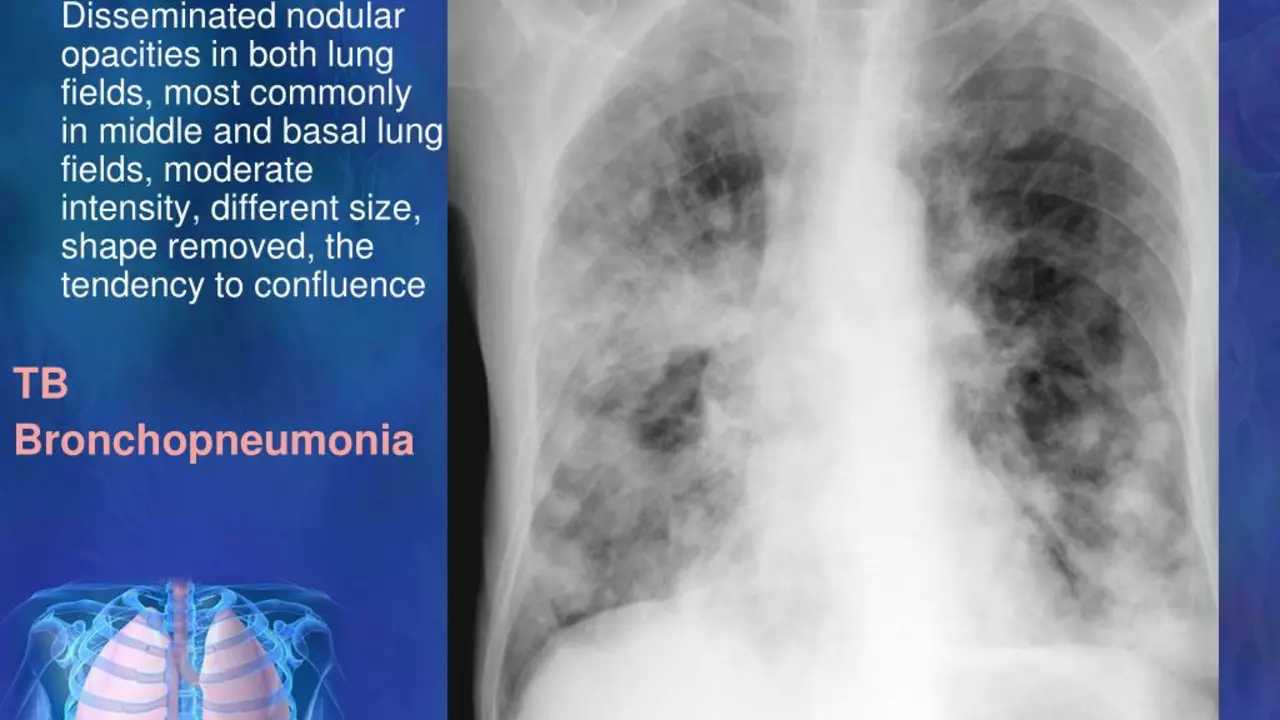The Role of Vaccination in Preventing Pulmonary Tuberculosis
 Jul, 1 2023
Jul, 1 2023
Understanding Pulmonary Tuberculosis: An Overview
Before we delve into the role of vaccinations in preventing Pulmonary Tuberculosis (TB), it's important to understand what this disease is. Pulmonary TB is an infectious disease caused by Mycobacterium tuberculosis bacteria. It primarily affects the lungs, but it can also spread and cause secondary infections to other parts of the body. This bacteria is airborne, which means it spreads when an infected person coughs, sneezes, or even talks.
TB is a major global health concern, with millions of people getting infected every year. It's especially prevalent in developing countries with poor healthcare systems. If left untreated, TB can be fatal. Yet, with the right treatment and prevention methods, it's entirely possible to control and even eradicate this disease.
Introduction to Vaccination
Vaccination is one of the most effective ways to prevent infectious diseases. A vaccine is a biological preparation that provides active acquired immunity to a particular infectious disease. It contains an agent that resembles the disease-causing microorganism and is often made from weakened or killed forms of the microbe, its toxins, or one of its surface proteins.
The agent stimulates the body's immune system to recognize the agent as a threat, destroy it, and keep a record of it. This way, the immune system can more easily recognize and destroy any of these microorganisms that it later encounters. Vaccination has played a central role in the eradication or control of several major diseases, including Smallpox, Polio, Measles, and Mumps.
The BCG Vaccine: A Shield Against TB
The Bacille Calmette-Guérin (BCG) vaccine has been the standard vaccine for preventing TB for many years. The BCG vaccine is made from a strain of Mycobacterium bovis, a type of bacteria that causes TB in cows, which is closely related to Mycobacterium tuberculosis, the bacteria that causes TB in humans.
The BCG vaccine is proven to be effective in preventing severe forms of TB in children, but its efficiency in adults varies widely, depending on geographical location. This variability is thought to be due to exposure to environmental mycobacteria.
Vaccination and TB Prevention: The Connection
Getting vaccinated is one of the most effective ways to prevent TB. The BCG vaccine stimulates your immune system to fight the TB bacteria. If you're exposed to the bacteria after being vaccinated, your immune system will recognize it and start fighting it off.
It's important to note that while the BCG vaccine can prevent TB, it doesn't guarantee complete protection. It's still possible to get the disease, but the chances are significantly lower. Moreover, the vaccine can reduce the severity of the disease if you get infected.
Current Research and Future Perspectives
While the BCG vaccine has been a significant weapon in the fight against TB, there's still a lot of room for improvement. Researchers are continuously exploring new ways to improve the efficacy of the BCG vaccine and developing new vaccines.
One promising area of research is the development of new vaccines that can provide better protection against TB or replace the BCG vaccine altogether. Several new TB vaccines are currently in clinical trials, and the results are promising.
The Importance of Vaccination in Global Health
The role of vaccination in preventing diseases like TB can't be overstated. Vaccines have saved countless lives and continue to do so. They are a crucial component of global health initiatives and play a vital role in our fight against infectious diseases.
It's important to remember that vaccination doesn't just protect the individual who gets vaccinated. It also protects the community by reducing the spread of the disease. This is known as herd immunity. When a critical portion of a community is immunized against a contagious disease, most members of the community are protected against that disease because there is little opportunity for an outbreak.

Tracy McKee
July 2, 2023 AT 09:57Stop pretending it works.
Abigail M. Bautista
July 2, 2023 AT 23:26Rohan Puri
July 3, 2023 AT 09:09Mandeep Singh
July 4, 2023 AT 10:19Chris Bellante
July 5, 2023 AT 15:10Also the term 'herd immunity' is misapplied here. TB isn't contagious enough for classic herd dynamics.
Nicole Manlapaz
July 6, 2023 AT 15:27Even if BCG isn't perfect, it's still a lifeline for kids in places with no hospitals. Every little bit counts 💪❤️
Frederick Staal
July 7, 2023 AT 14:20And yet here we are, glorifying a 100-year-old biological patch while ignoring the socioeconomic determinants that make TB endemic. This isn't medicine. This is moral evasion.
erin orina
July 9, 2023 AT 08:12Even if BCG isn't 100%, it's still one of the few tools we have to protect babies in high-risk areas. I hope more funding goes into next-gen vaccines soon 🌍✨
Lisa Uhlyarik
July 10, 2023 AT 20:29Kelley Akers
July 12, 2023 AT 16:59Cameron Perry
July 14, 2023 AT 04:47JOANNA WHITE
July 14, 2023 AT 22:08Peggy Cai
July 16, 2023 AT 07:03